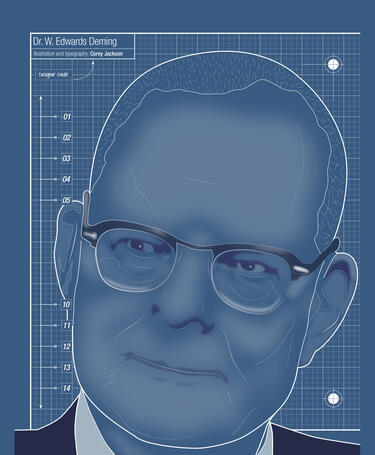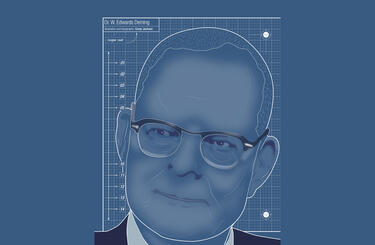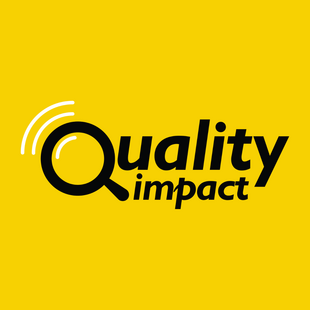
The quality professional in the era of sustainability and Quality 4.0
Progress indicator

Deming special interest group members Christopher Chinapoo CQP FCQI and Dr Kevan Leach examine the skills and roles the quality professional needs to operate collectively in the era of sustainability.
In the ever-evolving landscape of quality management, the philosophy of Dr W. Edwards Deming continues to resonate, particularly in the context of sustainability and the advent of Quality 4.0.
Here, we aim to highlight how the existing competencies of quality professionals enable the advancement of sustainability in the current era of sustainability and what is being labelled Quality 4.0, characterised by the integration of technology and sustainability demands. We will explore the evolving role of the quality professional, drawing on Deming's insights, to emphasise the need for a comprehensive, systems-based approach that incorporates circularity, environmental responsibility, and the lifecycle analysis of products and services.
Additionally, we suggest areas where further development of key competencies, such as systems thinking, data analysis and collaborative problem-solving, is essential to the value proposition for quality professionals to remain relevant and effective leaders in enabling sustainable innovation and achieving long-term organisational goals.
Fitness of purpose
Deming defined quality as the "fitness of purpose", emphasising in The New Economics that a product or service possesses quality if it helps somebody and enjoys a good and sustainable market. This perspective becomes even more relevant today as we navigate a world increasingly defined by the need for sustainability, innovation and the integration of technological advancements.
Deming's insights are profound in recognising that trade, competitiveness, innovation and sustainability are intricately linked to quality – that is, today designing for quality, managing for quality and managing quality in the organisation and beyond the boundaries of the organisation.
He foresaw that relying on non-renewable materials for economic prosperity was a temporary blessing, urging us not to live off borrowed money as a long-term solution. His foresight has become a beacon for quality professionals, emphasising the importance of considering the sustainability of products, operations and services.
In today's landscape, quality professionals and leaders are confronted with heightened expectations to deliver net-zero services and products, decrease emissions, enhance the circularity of goods, and ensure the sustainability of production and supply chains.
Navigating these challenges requires a concerted effort to establish and maintain traceability of products throughout the supply and value chain, partner across your business ecosystems, ensuring accountability and transparency in the pursuit of environmentally responsible and sustainable practices.
The present context is also characterised by an accelerated adoption and integration of technological advancements such as cybernetics, cybersecurity, industrial Internet of Things (IoT), autonomous robots, big data analytics, cloud computing, 3D simulations and augmented reality.
However, this surge in adoption is accompanied by a prevalent belief that automation and digitisation serve as a panacea for customer satisfaction and quality enhancement. Customers are far more discerning, and the attraction of such as digitisation soon fades in the customer’s view with time. This point was aptly shown by quality management lecturer and consultant Noriaki Kano in the 1980s with his categorisation of quality aspects, later shown in the Kano Model.
It is imperative for leaders to transcend this misconception and focus on cultivating a quality-centric culture. The emphasis should be on designing products and services that are not only reliable, uniform and durable, but also align with principles of sustainability, circularity, recyclability and repurposing. Now, more than ever, leaders must navigate the intersection of technology and quality with a strategic commitment to environmental responsibility and customer-centric excellence.
The overall lifecycle analysis of products is emerging as a core technical competency for quality professionals. Understanding the environmental impact of products from creation to disposal is crucial in a world increasingly concerned with net-zero goals, reducing material extraction, embracing circular economy principles and responding to climate risks. Quality professionals are now expected to possess a comprehensive understanding of the entire lifecycle, ensuring that products contribute positively to sustainability goals.
"By integrating systems thinking, embracing technological advancements, and fostering collaborative and sustainable practices, quality professionals can lead their organisations towards a future where excellence is synonymous with enduring value and environmental responsibility."
Navigating the transition towards greater sustainability and addressing climate risks requires a strategic approach and an enhanced appreciation for systems, people, psychology culture and how people learn, think, feel and act in varying circumstances and context.
Quality professionals need to equip themselves with critical multidisciplinary or transdisciplinary competencies to lead, co-design, co-create and facilitate this evolving landscape.
Key competencies
Here are several competencies that are becoming increasingly essential.
- Appreciation for systems competency
To effectively address complex sustainability issues, leaders must develop the competency to analyse systems across multiple domains and scales, considering factors such as change agents, cause-effect structures, feedback loops, interdependencies and cascading effects.
From a Deming perspective, a system is a network of interdependent components working together towards a shared aim. This aim must be well-understood by all members of the system and should include long-term plans. Successful system management requires deep knowledge of the relationships between these components, including the human elements that drive behaviour and decision-making. Without proper management, system components can become isolated or competitive, weakening the overall system and its ability to achieve its goals. Cooperation, not competition, is key to system optimisation. Systems are interconnected, interactive, interrelated and integrated; we must get out of managing and focusing on improving parts, which is often done at the detriment of the whole.
Further, systems extend beyond organisational boundaries, including relationships with competitors. By collaborating to expand markets or address unmet needs, competitors can collectively optimise outcomes. Deming emphasised that no single part of a system is more important than another. This highlights the importance of systems thinking and an integrated approach, where leaders consider long-term effects and root causes rather than just reacting to immediate issues. Building a deeper understanding of how to manage interdependencies, feedback loops, and change agents is essential for navigating complex, evolving challenges, especially those related to sustainability. - Futures-thinking competency
Ability to explore future developments and anticipate how sustainability issues might evolve over time, considering inertia, path dependencies and triggering events. - Values-thinking competency
Ability to identify and apply sustainability values, principles, goals and targets, emphasising environment stewardship, justice, and equity, diversity and inclusion (EDI). - Strategic-thinking and management competency
Ability to design and plan transformative interventions and transitions toward sustainability, accounting for leverage points, power dynamics, uncertainty and social and organisational learning. - Interpersonal competency
Ability to motivate and facilitate collaborative and participatory sustainability research and collective problem-solving processes, fostering interdisciplinary collaboration and diverse ways of knowing. Understanding teams and team dynamics. - Intrapersonal competency/mindset
Ability to proactively engage as a change agent for sustainability, including self-awareness, reflection, and continuous improvement drawing on competencies of emotional intelligence. - Psychology competency
Understanding human factors, such as how people learn, think, feel, and respond emotionally and neurologically, is critical to managing and inspiring action and sustaining behaviours change for sustainability. This competency involves applying emotional intelligence to foster intrinsic motivation, address resistance, and create meaningful connections that drive collective action. Psychology helps leaders navigate human issues, making it essential for sustaining long-term engagement and transformation efforts. - Integration and implementation competency Ability to collectively realise planned solutions over time, collaborating with others on monitoring, evaluation and addressing emerging challenges.
- Integrated problem-solving competency
Ability to select appropriate problem-solving frameworks for complex sustainability problems and apply them to co-create viable solution options through problem analysis, sustainability assessment, visioning and strategy building. - Team facilitation competency
Whether in business, nonprofit organisations, or community initiatives, the ability to guide and enhance team interactions is key to achieving shared goals. This competency encompasses a range of skills and strategies that empower a facilitator to enable an environment where diverse talents flourish, ideas are openly exchanged and collective success is realised. - Data synthesis, analysis, integration and fact/evidence-based decision-making competency
Proficient in data synthesis, analysis, and integration, with a keen ability to extract meaningful insights from complex datasets. Skilled in making fact-based decisions, connecting strategic objectives to data-driven outcomes for informed and impactful results. Uses cutting-edge technologies and critical thinking to ensure appropriate, ethical and effective use of data for organisational success. - Stage 0 management competencies
Managing for and Managing Stage 0, as introduced by Deming in the second edition of The New Economics, highlights the need to go beyond continuous improvement and focus on system redesign and transformation. While improvement is essential, Deming emphasised that incremental changes alone are insufficient in a rapidly evolving world where innovation can render old systems obsolete, as seen with the carburettor engine. Stage 0 is the starting point of reimagining an organisation, requiring leaders to embrace competencies like appreciative inquiry, design thinking, and eco-design to envision and create entirely new systems that meet evolving customer needs.
To effectively manage Stage 0, leaders must foster a culture of experimentation and innovation through Plan, Do, Study, Act (PDSA) cycles, customer discovery, and managing innovation portfolios and ecosystems. This forward-thinking approach encourages organisations to balance incremental improvements with bold, disruptive innovation that leads to long-term transformation. By developing these competencies, organisations can stay ahead of change, reimagining their future and designing systems that are not only sustainable but also resilient to shifts in the market and technology. As Deming advised aptly: “We must keep asking what product or service would help our customers more? We must think about the future. What will we be making five years from now? 10 years from now?”
At first sight, this looks like a long shopping list of desirable attributes. But, as we gather from such as Google’s Project Aristotle leader Julia Rozovsky and Harvard Business School professor Amy Edmondson, knowledge is important, but the key to success lies in teams whose members have high interpersonal skills, who are focused on the organisation’s True North, and who see that they are engaged in meaningful work.
Integration, communication and collaboration
Being multidisciplinary and transdisciplinary is essential in today's quality environment, as complex challenges require integrating diverse perspectives and expertise to identify opportunities, find, manage, deploy and continually improve innovative solutions. Collaboration across fields enhances appreciation for systems, enabling organisations to address interdependencies and drive sustainable improvements.
As we step into this age of integration, communication, and collaboration, innovative approaches are becoming even more paramount and central to customer delight. Quality professionals must combat siloed thinking and approaches, the desire to remain static, leverage technology where applicable to context, continue to build collective and individual active learning, and leadership skills to navigate the complexities of Quality 4.0 and sustainability.
Embracing data synthesis and analysis, facilitating creative processes, managing change effectively, and utilising technologies for design and programming are all integral parts of this transformative journey.
Moreover, quality professionals need to be adept at the integrated application of Deming’s System of Profound Knowledge (SOPK), the holistic and interconnected relationships within teams, and in using continuous improvement methodologies like PDSA.
The quality professional needs to possess team and collaborative competencies, using tools and judgement judiciously in the right places at the right times. The ability to monitor, verify and control processes, coupled with a keen understanding of technology design and programming, positions quality professionals as catalysts for positive change.
Summary
In conclusion, the quality professional of today must be equipped with a diverse set of competencies to thrive in the era of sustainability and Quality 4.0. Deming's timeless wisdom provides a foundation, emphasising the need for quality to be synonymous with sustainability.
By integrating systems thinking, embracing technological advancements, and fostering collaborative and sustainable practices, quality professionals can lead their organisations towards a future where excellence is synonymous with enduring value and environmental responsibility.
Above all, the quality professional needs to play a fully integrated and wide-ranging role within the autonomous team structure of tomorrow’s enterprises.
Join the CQI's Deming special interest group
Discuss the themes covered in this article with like-minded quality professionals as part of the CQI's Deming SIG.
The latest from the CQI Podcast

Listen to the Quality Impact podcast, where experts share insights on the evolving role of quality across industries.
Quality World

Get the latest news, interviews and features on quality in our industry leading magazine.



